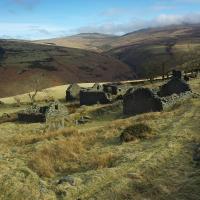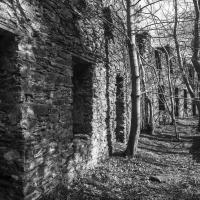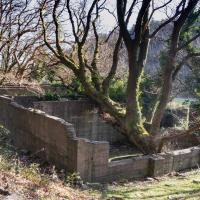Tholtans basically ruined houses or old farm buildings, and technically minus their rooves - are a feature appearing on many of our hillsides. Ray Kelly, a long-time friend of the IOMPS and a judge for our competitions, has written three books on tholtans entertaining, with lots of anecdotes and accompanied by many super images and which provide an excellent introduction as well as a location guide so you will know where to find them.
Killabregga is a wonderful example - now owned by Manx National Heritage, it was a hill farm, situated high above the Sulby valley on its southern flank, half a mile or so off the Druidale Road. In good weather it is a glorious location and a very pleasant walk with views across the valley and up to Snaefell, but in winter, conditions can be dire. Farmed by the Kinrade family, presumably on what we would now call a subsistence basis, it operated right at the boundary of viability until the early 20th century when the family moved down into the Sulby valley, although some activities continued up on the hillside into the 1940s.
Another example of tholtans can be found in Glen Rushen where the decaying remains of a terrace of six miners cottages can be seen, a short distance up the valley from Glen Maye. They are believed to have been built in the 1850s or 1860s for the foremen, managers and their families of the IOM Mining Company - the miners themselves would have walked from the nearby villages of Patrick, Dalby and Glen Maye and perhaps even further away. The company was very profitable through the second half of the 19th century but the ore ran out in the early 20th century and operations ceased in 1911.
My third example, and the oddity referred to, is to be found in the Cornaa valley, not far from the shingle beach and up the valley. Here, the concrete walls of a ruin are all that remain of an unfinished explosives factory. Dating from 1890, the factory was intended to make bellite an explosive based on ammonium nitrate and considered safer than dynamite for use in the mining industry, then a major employer on the island. Having been refused permission to build the factory in the UK due to safety concerns, the Manx government of the day initially allowed the development given its remote and isolated position. However, public opinion and similar safety concerns led to a change of mind and the eventual withdrawal of government support. The factory was never completed, the roof never even being started.
Given the current Covid-19 situation, our programme is in abeyance and we are unable to provide a date for our next meeting, so please check our website www.iomps.com or our Facebook page for details of any updates or changes. Our meetings are held the St John Ambulance HQ on Glencrutchery Road, starting at 7:00 pm and are open to the public (non-members with a modest entry fee), and all will be given a very warm welcome.
The Isle of Man Photographic Society is supported by the Arts Council
Chris Blyth
CAPTIONS:
IMAGE 01: Killabregga by Chris Blyth
IMAGE 02: Glen Rushen Terrace by Chris Blyth
IMAGE 03: Cornaa Explosives Factory by Chris Blyth



